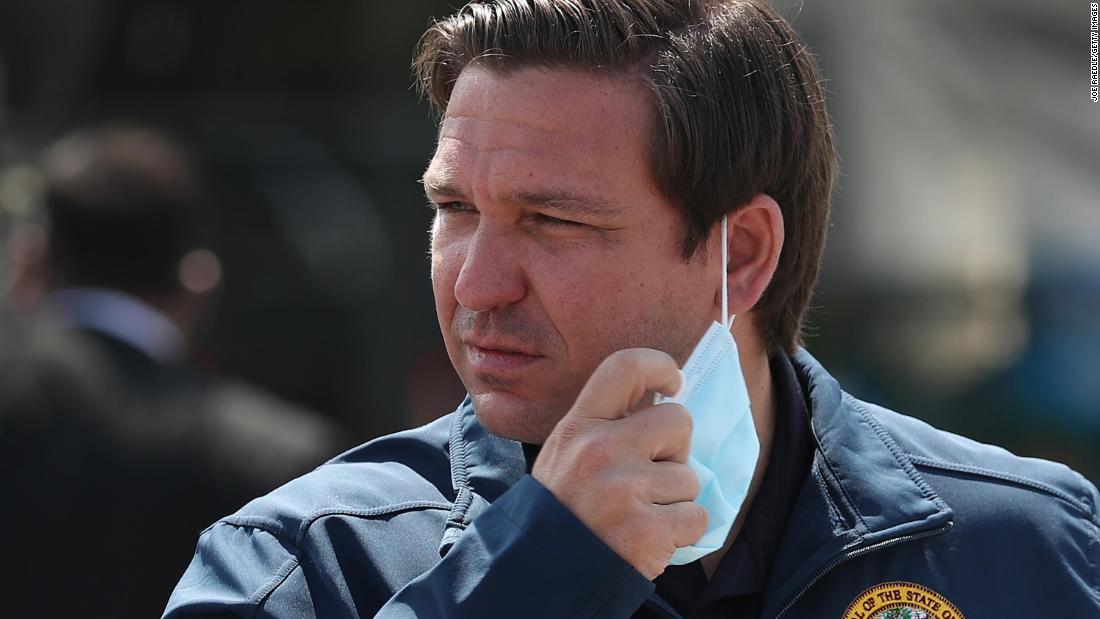
To put the 15,300 cases in Florida on Saturday in some context, it was two months into the pandemic before the US reported more than 15,000 cases in a single day nationwide. And, on Tuesday, Florida announced 132 new deaths from coronavirus, its highest single-day total to date.
"Miami is now the epicenter for the virus," said Dr. Lillian Abbo, an infectious disease expert with the Jackson Health System, on Monday afternoon. "What we were seeing in Wuhan five months ago, we're now seeing here."
Faced with such a massive challenge, the question many are asking now is whether Florida's newly minted governor -- Republican Ron DeSantis -- is up to the job.
In an editorial headlined "Ron DeSantis should lead or get out of the way on coronavirus," the Orlando Sentinel puts it bluntly:
"If coronavirus were a hurricane, it seemed to reach Category 5 status over the weekend. More than ever, Florida needs decisive, resolute guidance to get through this storm.
"Instead, Ron DeSantis continues to muddle and spin his way through. For every good move, there have been too many missteps...
...The one thing we've all learned about COVID-19 is the need for humility. It's far too unpredictable for anyone to declare that victory or doomsday is at hand. But DeSantis has too often acted as if he wanted nothing more than to hang up a 'mission accomplished' banner."
That editorial comes just hours after a viral video of a heckler interrupting a DeSantis' press conference on Monday to demand that he resign. (He didn't.)
Amid this increasing scrutiny, DeSantis is responding much like his political benefactor: Donald Trump.
The Florida Republican insisted Monday that one of the major reasons for the surge in positive cases was due to the increased testing in the state, noting that 144,000 Covid-19 tests were conducted on Saturday alone. "The whole United States was probably not doing 144,000 tests in March," said DeSantis. That echoes Trump's argument on Monday afternoon that "we test more than anybody, by far. And when you test, you create cases." (That is, of course, not true.)
DeSantis is also following Trump's lead in making the case that many of the people who are contracting Covid-19 in Florida are now younger and, therefore, much less likely to die from the illness or even get sick enough to need hospitalization. That claim is belied somewhat by the rising death toll (see above) and by reports of intensive care units in the state being overwhelmed by the spike in patients needing critical care.
In addition to the pressure DeSantis faces from Trump to hold the line -- the President waded into the Florida GOP primary in 2018 to endorse DeSantis -- there's also this complicating factor: DeSantis (and his administration) spent much of May on a victory lap, insisting that his policies had been right and the doubters had been wrong.
"None of these people knew anything about Florida at all, so I didn't care what they were saying," DeSantis told National Review's Rich Lowry of those who had criticized both his slow closing of the state in April and his quick re-opening in May. "I researched the 1918 pandemic, '57, '68, and there were some mitigation efforts done in May 1918, but never just a national-shutdown type deal. There was really no observed experience about what the negative impacts would be on that. So I was very concerned about things on that side as well and I think that's why I had a more nuanced and balanced approach than some of the other governors."
Riiiiight.
Need more? In response to a May 5 Orlando Sentinel article reporting that one projection suggested that the death toll in Florida from coronavirus could reach almost 4,000 by August, DeSantis' spokesperson Helen Aguirre Ferre tweeted this:
"This alarmist headline mimics the erroneous headlines of the recent past that were based on models that were wrong. If you want to get it right speak to @GovRonDeSantis."
More than 4,400 Floridians have died. And it is July 14.
When you push the we-were-right-and-everyone-else-was-wrong narrative, then you had better hope that the data backs you up. And, for DeSantis, it, well, doesn't.
So, what now? Politicians h-a-t-e admitting they were wrong -- particularly on something as high profile as the coronavirus. But, that's what other governors -- Gavin Newsom in California, Greg Abbott in Texas -- in states facing coronavirus surges have done in recent days. Abbott implemented a mask mandate while Newsom closed virtually all indoor spaces in the Golden State on Monday.
DeSantis hasn't done anything like that yet.
He's been saying publicly for the better part of the last week that cases in the state are "stabilizing" despite ample evidence that that's not true. As for mandating that people wear masks in public, DeSantis has been skeptical. "To do police and put criminal penalties on that is something that is probably gonna, would backfire," he said late last month, adding: "We're gonna continue to put out the messaging, we're gonna continue to put out the guidance, and we're gonna trust people to make good decisions."
The situation in Florida appears to be on the verge of becoming totally out of control -- if it's not there already. DeSantis seems unwilling to acknowledge that reality -- and how wrong he was about his state's battle against the virus.
"news" - Google News
July 14, 2020 at 11:19PM
https://ift.tt/38ZRfz1
Can Florida's governor admit he was wrong about coronavirus? - CNN
"news" - Google News
https://ift.tt/2DACPId
https://ift.tt/2Wh3f9n
Bagikan Berita Ini















0 Response to "Can Florida's governor admit he was wrong about coronavirus? - CNN"
Post a Comment